|
Printables |
PowerPoints |
Online exercises |
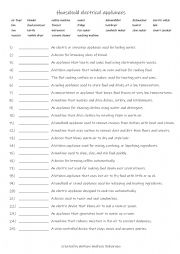
|
A1+-A2 Household electrical appliances
First, students need to familiarise themselves with the 25 words and their meanings Then they read the definitions to see which one is being described and write that word in the space provided. Answers on page 2.
Level: elementary
Age: 8-100
Type:
Downloads: 100
|
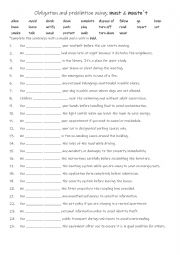
|
A2-B1 Obligation and prohibition using must & mustn�t
Students read the sentences and decide what modals and verbs are needed to complete the sentences. After the work has been checked, students could have a speaking reinforcement activity in pairs or small groups. They could discuss the sentences and give their opinions or reasons for or against. This worksheet is suitable for A2 -B1 LEVEL. Answers O...
Level: intermediate
Age: 8-100
Type:
Downloads: 107
|
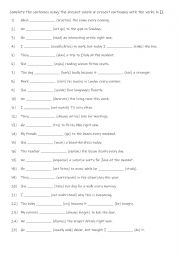
|
A2-B1 Complete the sentences using the present simple or present continuous with the verbs in bold.
students read the sentences to look for time markers to indicate what tense is required, they then complete the gap-fill using the infinitive in () and the correct tense. Answers on page 2.
Level: elementary
Age: 8-100
Type:
Downloads: 132
|
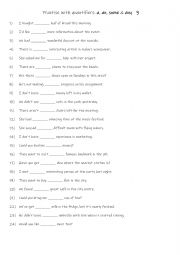
|
A1-A2 Practise with quantifiers a , an , some & any 3
Mastering these basics is essential for both everyday communication and more advanced language use, as these quantifiers are frequently used in real-life scenarios like offering, requesting, or describing items. First, students need to familiarise themselves with 4 quantifiers and check their meaning and use. Then they read the sentences to see whi...
Level: elementary
Age: 7-100
Type:
Downloads: 107
|
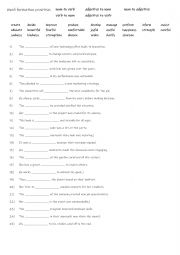
|
B1-B2 Word formation practise - noun to verb, adjective to noun, noun to adjective, verb to noun, adjective to verb
Practising word formation�changing words between forms like noun to verb, adjective to noun, or verb to adjective�enhances vocabulary flexibility and allows for more precise and varied expression. This skill is particularly useful for both speaking and writing, as it helps students adapt words to fit different contexts without losing meaning. For e...
Level: intermediate
Age: 9-100
Type:
Downloads: 113
|
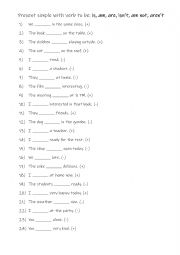
|
Present simple with verb to be: is, am, are, is not, am not & are not practise
Students read the sentence and complete the sentence with the correct form of the verb to be. They use the (+) or (-) sign at the end of the sentence to see if it needs a positive or negative form of the verb to be. Answers on page 2
Level: elementary
Age: 8-100
Type: worksheet
Downloads: 108
|
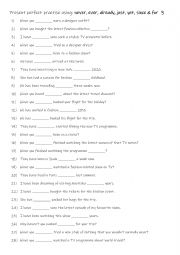
|
A2+-B1 Present perfect practise using never, ever, already, just, yet, since & for 3
First, students need to familiarise themselves with adverbs and their use. Then they read the sentences to see which one is needed to complete the gap-fill. Answers on page 2.
Level: intermediate
Age: 8-100
Type:
Downloads: 116
|
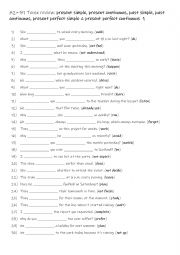
|
A2+-B1 Tense review: present simple, present continuous, past simple, past continuous, present perfect simple & present perfect continuous 1
Learning these tenses is essential for effective communication in English, as they allow students to express actions and events across different timeframes. The present simple and present continuous help describe habits, routines, and ongoing actions or future plans, while the past simple and past continuous enable clear narration of completed acti...
Level: intermediate
Age: 9-100
Type:
Downloads: 108
|
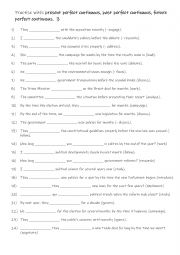
|
B1-B2 Practise with present perfect continuous, past perfect continuous, future perfect continuous. 3
By using these forms, students can enhance their narrative skills, link multiple events, and communicate more flexibly, making their speech and writing more natural, clear, and sophisticated. First, students need to familiarise themselves with the 3 tenses and use. Then they read the sentences to work out which one is needed to complete the gap-fil...
Level: intermediate
Age: 10-100
Type:
Downloads: 112
|
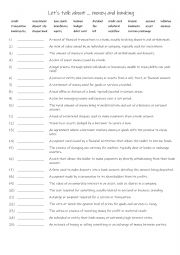
|
B1-B2 Let�s talk about ... money and banking
First, students need to familiarise themselves with the 25 words and their meanings Then they read the definitions to see which one is being described and write that word in the space provided. Answers on page 2.
Level: intermediate
Age: 12-100
Type:
Downloads: 111
|
|
|
|
|












